Answers
I. Theme v1.24
With the Answers Hitchhikers Theme v1.24, we’ve added several new formatters, styling updates, and more.
You can find the full list of features and bug fixes below, with additional details available in the Community.
- Open Status Automation: Edit open status translations directly in the relevant .po file
- New Formatter for Currency: Convert the $ value to the localized currency of your Answers experience
- New Formatter for Categories: Show the Categories of your entities on the frontend of your Answers experience
- Styling for Video and Prominent Image Card: Unified the height of all images and videos
- Text Highlighting for Google Chrome to view details on doc-search standard cards: Clicking “View Details” on a direct answer will now highlight the answer on the page (only available in Google Chrome)
Looking to upgrade to this version? It is very important to read this community post for instructions and upgrade considerations.
II. Bucketed Distance
Sometimes, sorting by distance is too literal. For example, if one location is 500 feet closer than another location, that hardly matters to the user. Now using Bucketed Distance you can sort those two locations based on relevance instead.
For example, you might configure your distance buckets like so:
{
"sortBys": [
{
"type": "ENTITY_DISTANCE",
"buckets": [
8046.72, // 5 miles
80467.20, // 50 miles
160934.00 // 100 miles
]
},
{
"type": "RELEVANCE"
},
{
"type": "ENTITY_DISTANCE"
}
]
}In the UI, this would look like:

This configuration would instruct the Answers experience to first sort by which distance bucket the location falls in. That means that all locations within 5 miles would show up first sorted by relevance and then by continuous distance (if two locations within 5 miles have the same relevance). Then the locations within 50 miles would surface, sorted by relevance and then continuous distance, and so on.
Have any feedback or questions? Leave us a note in the Community here.
III. Filter Search Terms by Referrer URL
If you have your Answers experience integrated in multiple places (say, a help site, a contact form, and a Zendesk Agent Dashboard), your users might be asking very different questions depending on where they are searching. Previously, you could create a custom report in Report Builder. Now you can analyze these trends by filtering by Referrer URL on the Search Terms page.

You can now filter down to only the search terms and associated metrics (like Searches, Sessions, and Clicks) that were searched from a particular Referrer Page. The filter accepts an exact referrer page URL or a substring that the Referrer Page URL must contain.

Have any feedback or questions? Leave us a note in the Community here.
IV. Answers Snippet Generator
One of the most common ways to integrate an Answers experience with your website is to add JS snippets to the page. In addition to guides for the Search Bar and Search Results integration, Answers now offers an in-platform Snippet Generator.
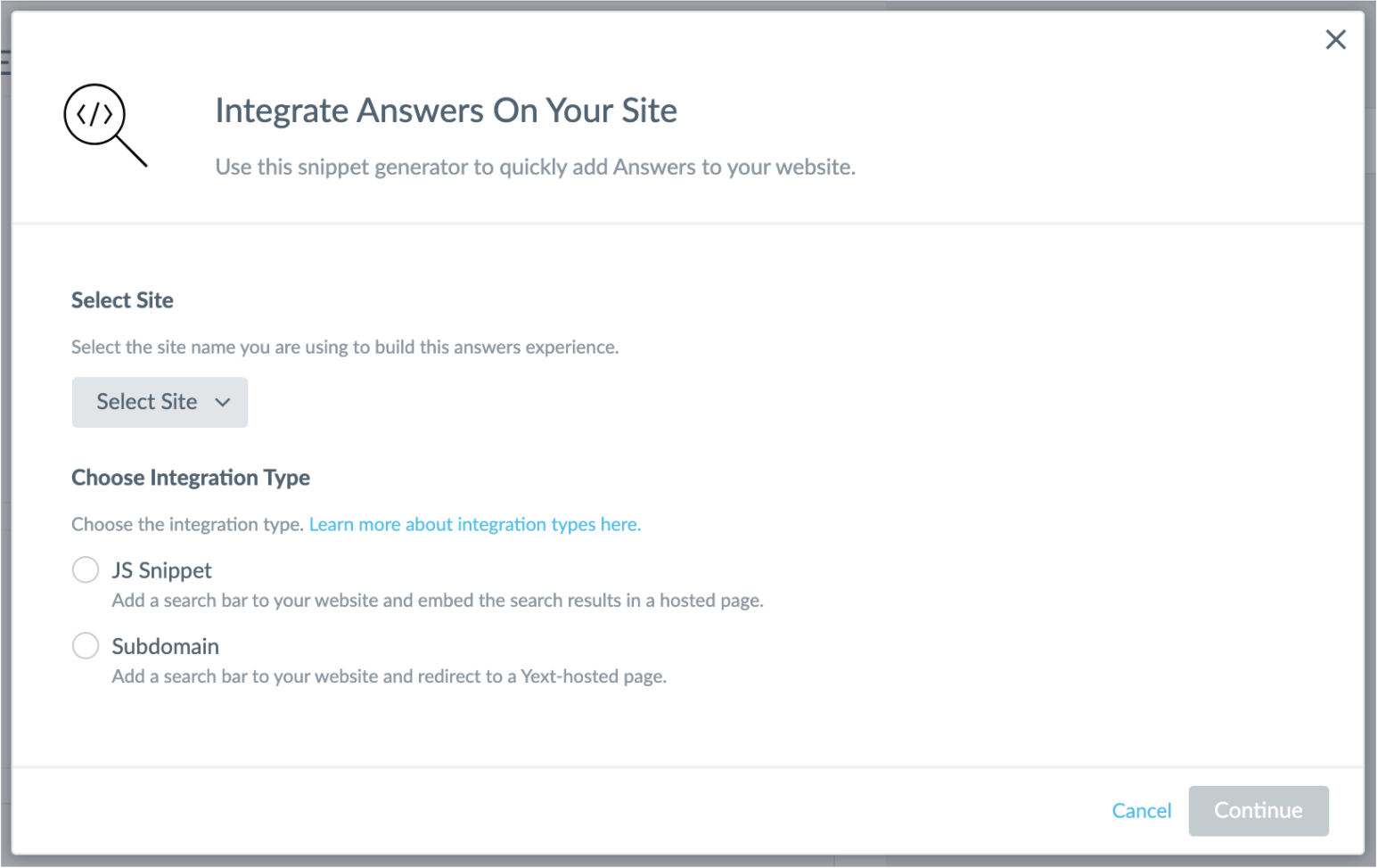
This convenient tool walks users through the process and automatically produces the JS code snippet needed to complete integration. Users can then easily copy and paste the premade snippet into their site.
Have any feedback or questions? Leave us a note in the Community here.
V. Improved Query Suggestions Ordering
The Query Suggestions engine includes a typo tolerance so the search bar can surface suggestions that do not exactly match what the user is typing but are close. However, in use cases like searching for products, searchers would prefer exact matches for the product name being typed to appear at the top, not randomly in the list of suggestions. For example, a searcher typing “iPhone 11” would expect to see the suggestion “iPhone 11” at the top of the list, not “iPhone 12” even though the terms are similar. Now, we’ve updated the Query Suggestions engine so that exact matches to the query being typed surface ahead of any other suggestions.
Have any feedback or questions? Leave us a note in the Community here.
Listings
I. Yelp Accepts ‘Fully Vaccinated Staff’ and ‘Proof of Vaccination Required’ Fields
Brands can now indicate on Yelp listings whether staff is fully vaccinated, or if proof of vaccination is required for entry by filling out the COVID Vaccination Requirement Fields in the Knowledge Graph.
For more information on these fields, see the New COVID Vaccination Requirement Fields section of the Release Notes.
Have any feedback or questions? Leave us a note in the Community here.
II. Yalwa Supported Country Changes
Yalwa now supports listings in Algeria (DZ), Costa Rica (CR), Ecuador (EC), Egypt (EG), Ghana (GH), Guatemala (GT), Kenya (KE), Paraguay (PY), Saudi Arabia (SA), Thailand (TH), and Vietnam (VN). Yalwa no longer supports location listings in Jamaica (JM), Morocco (MA), Tanzania (TZ), and Uganda (UG).
Yalwa listings will be removed from the Listings tab in the Yext dashboard for location entities in these countries. Yalwa is a locations listings directory that helps users find information about local businesses and enables them to leave reviews.
Have any feedback or questions? Leave us a note in the Community here.
III. Locanto Supported Country Changes
Locanto now supports event listings in Algeria (DZ), Costa Rica (CR), Ecuador (EC), Egypt (EG), Ghana (GH), Guatemala (GT), Kenya (KE), Paraguay (PY), Saudi Arabia (SA), Thailand (TH), and Vietnam (VN).
Locanto no longer supports event listings in Jamaica (JM), Morocco (MA), Tanzania (TZ), and Uganda (UG). Now, more brands than ever before can get their events listed on Locanto.
Have any feedback or questions? Leave us a note in the Community here.
IV. Google Local Posting Available for Enterprise Customers
Google Local Posts allow businesses to communicate directly with their customers through timely updates about the business such as announcements around sales, specials, events, news, and offers. Enterprise businesses can now leverage Google Local Posting through the Yext platform! Google has updated guidelines to allow “chain” businesses (10+ locations) access to Local Posting via API. There is no longer a restriction that local posts must be COVID-related. Users can send local posts in the Post sub-tab of Listings.
Have any feedback or questions? Leave us a note in the Community here.
Pages
I. Page Builder Vanity URLs
Users now have the ability to customize URL paths for pages built using Page Builder. This gives clients more control and flexibility of how their URL is generated instead of using an auto-generated URL. Having a custom URL allows customers to better align their website with their brand.
By default, Page Builder leverages the name field of an entity to generate URLs:
- Example:
[domain-name].com/[name]-[numeric-hash]
With the Vanity URLs feature, users can select a field of their choice from the Knowledge Graph to use in place of the name.
For example, if a user were to select a field containing the [[name]-[geomodifier]] - this would result in the following URL:
[domain-name].com/[[name]-[geomodifier]]-[numeric-hash]
Note:
- Published URLs will still contain the numeric hash at the end of URLs
- This feature is intended to be used for net-new pages. This feature will not impact the structure of live published URLs.
Have any feedback or questions? Leave us a note in the Community here.
Knowledge Graph
I. New COVID Vaccination Requirement Fields
We are releasing two new built-in fields related to COVID vaccination requirements. The Proof of Vaccination Required field allows you to mark whether or not a Location, Restaurant, or Hotel requires proof of vaccination for entry. Additionally, the Fully Vaccinated Staff field allows you to signify whether or not your Location, Restaurant, Hotel, or Healthcare Facility staff is fully vaccinated. These fields will be sent to each listings publisher when the fields are accepted.
Have any feedback or questions? Leave us a note in the Community here.
II. Support for Hourly Runs
In addition to the Daily, Weekly, and Monthly frequency options that we had support for already, we can now support “Hourly” as a schedule option for Connectors. Users can choose “Hourly” as their schedule option or “Custom” and select “Hour” as the unit with a custom repeat interval (as is supported for Daily, Weekly and Monthly today).
Have any feedback or questions? Leave us a note in the Community here.
Crawler
I. Sub Pages Wildcard Support
Crawling a specific set of pages is a commonly used function of the crawler. The Sub Pages Crawl Strategy allows admins to target a specific set of pages with a specified base domain (example: www.yext.com/blog). Sometimes, however, the base domain of the desired sub pages to crawl do not match the top level URL. Administrators can now specify an optional additional wildcard URL path to spider to in addition to pages that match the inputted URL’s base domain.
For example, imagine a brand is interested in crawling all of their blogs. Most posts live on URLs with the structure yext.com/blog/*, but some live on URLs with the structure yext.com/products/blog/*. Because the base URLs do not match exactly, some pages will be left out of the crawl. Now users can specify the sub page structure to include yext.com/products/blog/* allowing the crawler to crawl all desired pages.
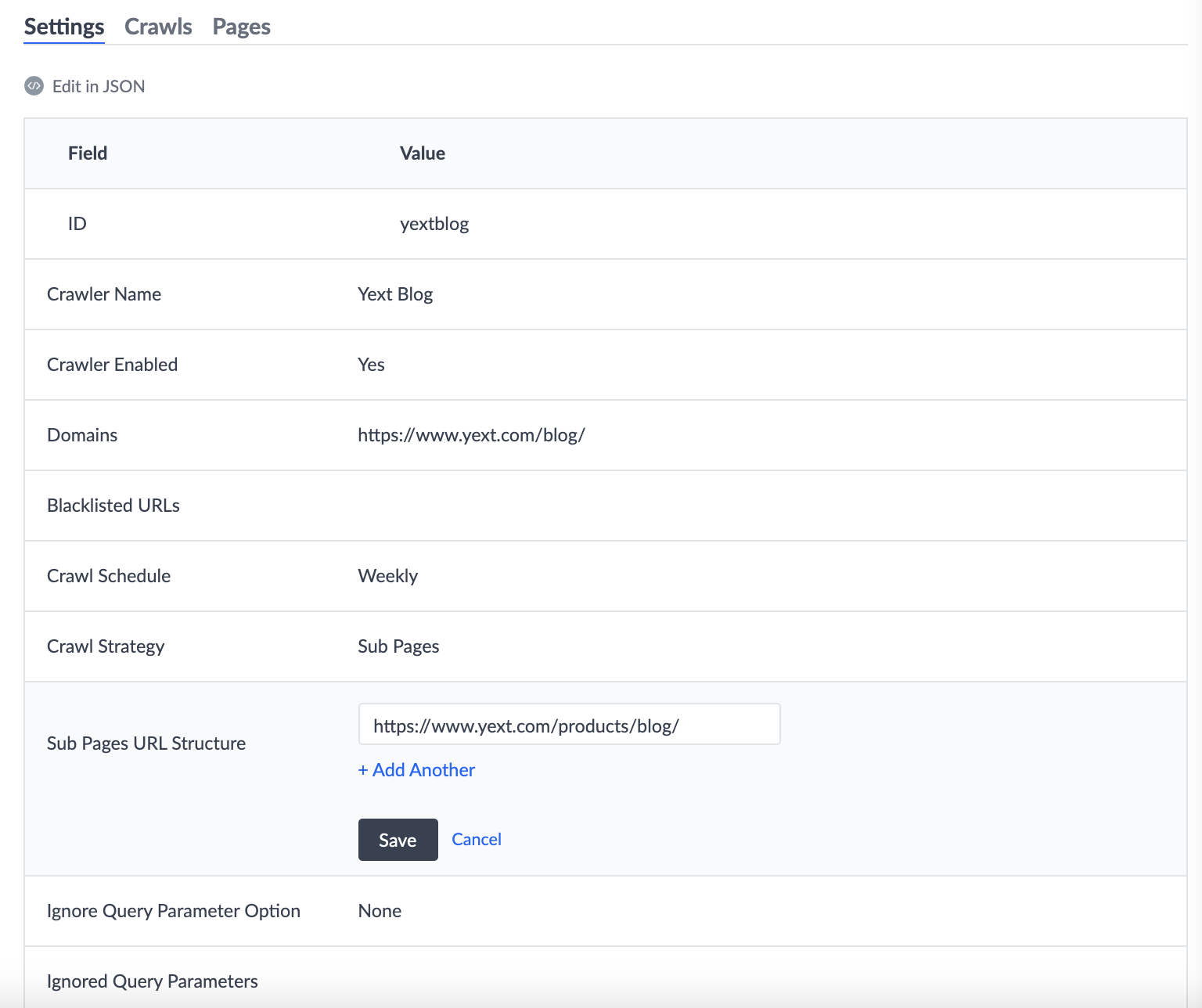
Have any feedback or questions? Leave us a note in the Community here.
II. View Full Raw Page HTML
Administrators now have the ability to view the raw HTML of crawled pages, so they can see exactly which data was crawled. This can help understand if the crawler successfully accessed the content they are looking for. Users can view this feature by clicking the View HTML button on the pages tab for a crawler.
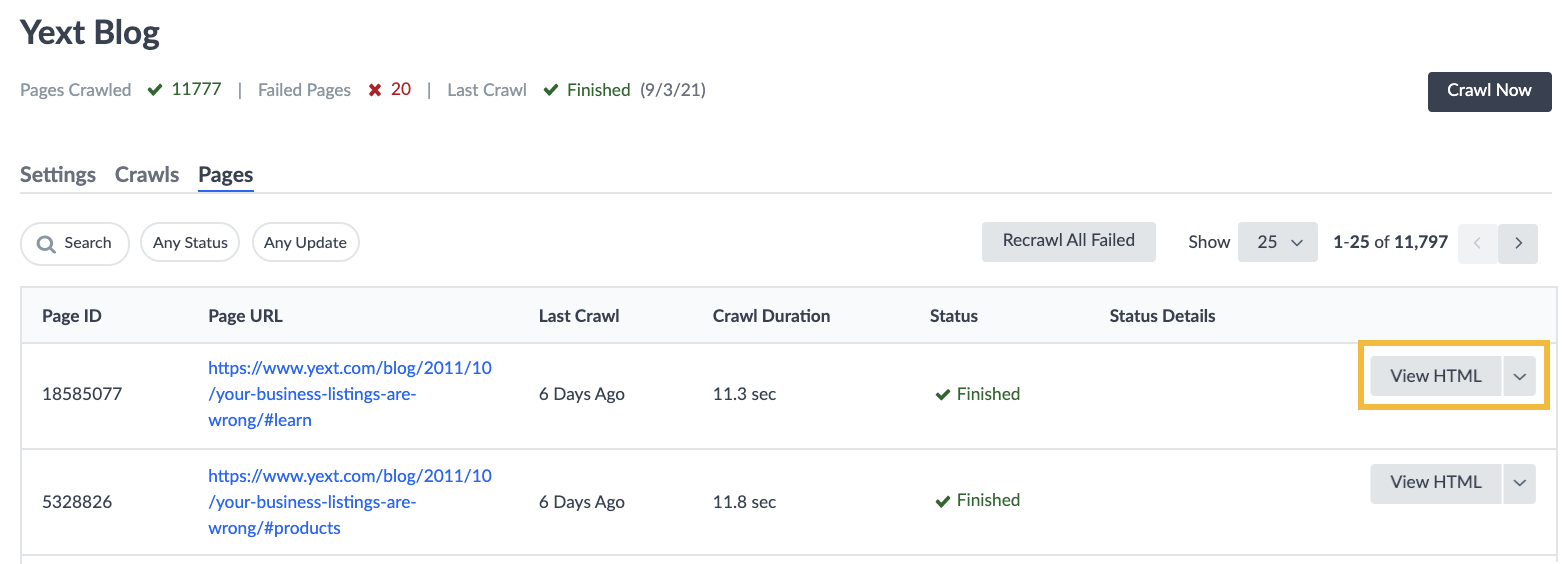
Have any feedback or questions? Leave us a note in the Community here.
III. Detailed Page Crawl Failure Reasons
Administrators now can better troubleshoot Crawler errors by viewing error details in the new Status Details column. For example, if the crawler was blocked from crawling a page, users will see crawler blocked in Status Details. Users will then know to ensure that both the Crawler’s user agent and IP addresses are whitelisted.
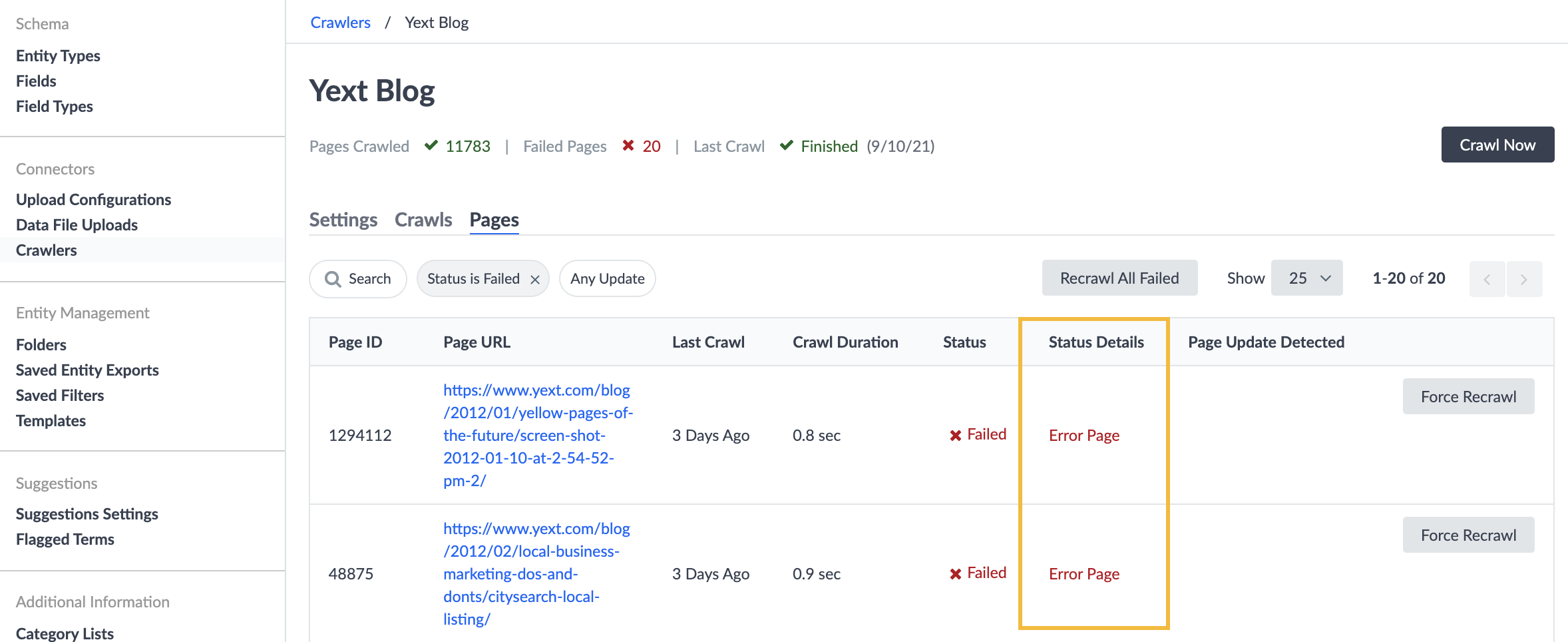
Have any feedback or questions? Leave us a note in the Community here.
IV. Search Bar for Page URLs
In the Crawler, users can now search the table by page URL to quickly find the results of crawling that page.
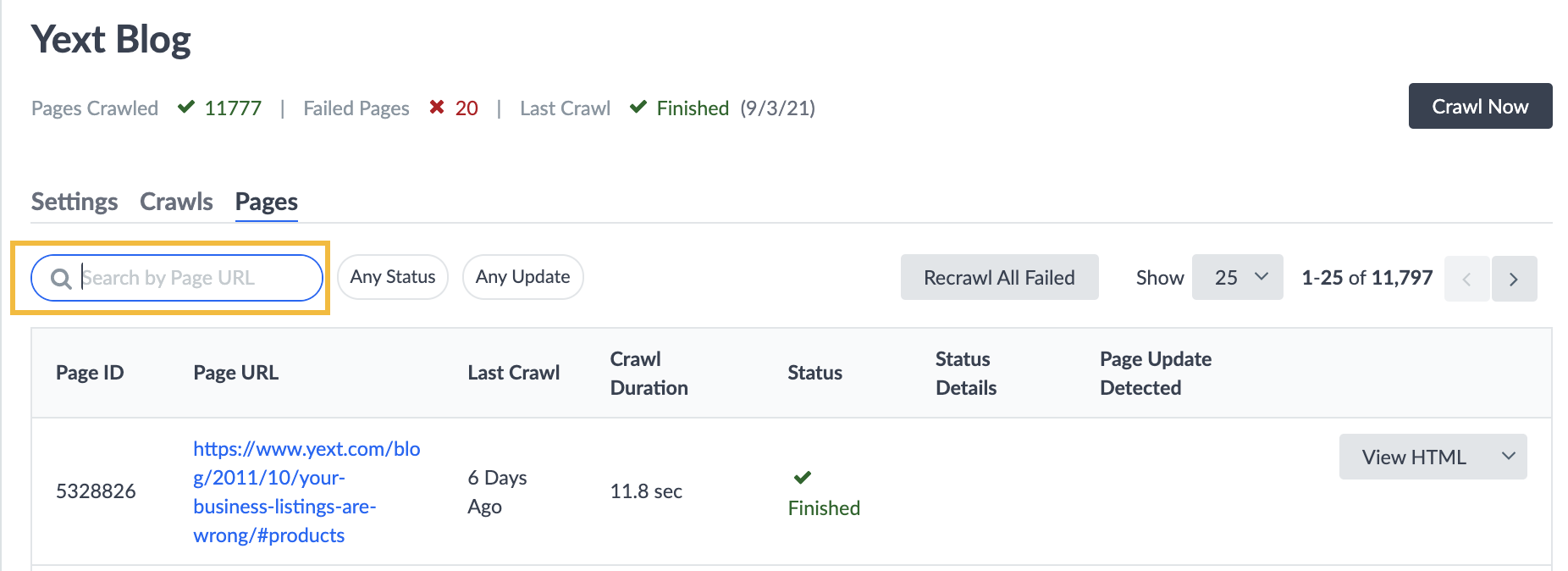
Have any feedback or questions? Leave us a note in the Community here.
Connectors
I. Merge Columns Transform
Users can now combine two or more columns into a new column with an optional delimiter when uploading data into their Knowledge Graph.
Have any feedback or questions? Leave us a note in the Community here.
II. Offset Limit Pagination Option
We added support for standard Offset Pagination for “Pull from API” Connectors. Using this pagination method, users can supply the offset and limit keys to be passed as query parameters, as well as a starting offset value and limit value.
Have any feedback or questions? Leave us a note in the Community here.
III. Link Header Pagination Option
We added support for Link Header pagination, following RFC-5988 . Users can supply the relation label that is used to indicate the next link in the sequence (usually this is “next”), as well as if the link is a full or relative URL.
Have any feedback or questions? Leave us a note in the Community here.
IV. Vimeo Connector
With the new Vimeo connector users can now pull their brand’s videos directly into their Knowledge Graph allowing them to add multimedia to Answers experiences with built-in video cards, embed videos onto your web pages, analyze Vimeo data using Yext Analytics and more.
Have any feedback or questions? Leave us a note in the Community here.
V. Twitter Connector
With the new Twitter connector users can now pull their brand’s tweets directly into their Knowledge Graph, allowing them to surface tweets on their pages as well as marketing, support, and workplace search experiences.
Have any feedback or questions? Leave us a note in the Community here.
VI. Guru Connector
With the new Guru Data Connector, users will be able to pull in all of the Guru cards from their Guru organization into your Knowledge Graph, allowing them to surface content on relevant search experiences.
Have any feedback or questions? Leave us a note in the Community here.
Streams
I. Streams API — Multi-Locale Support
As of this release, Streams can now support multiple locales in a single Streams API. Users can now request documents in a specific locale, or fetch documents from multiple.
For example, if you had profiles in both English and Spanish, you could use a Streams Endpoint which includes both English and Spanish locales. When a user visits your site, you could make a request for the Streams API to only fetch the profile for the relevant locale.
This can be used for developers utilizing the Streams API when building consumer-facing applications, to ensure the content is properly localized for end-users based on the localized profiles in the Knowledge Graph!
Have any feedback or questions? Leave us a note in the Community here.
Analytics
I. New Dimensions and Filters in Analytics
We’ve added additional dimensions in Report Builder so you can analyze even more information on your Answers experiences.
New Dimensions / Filters include:
- User Region: Region of user running Search
- User Postal Code: Postal Code of user running Search
- Browser: Browser of user running Search
- Direct Answer Type: Type of Direct Answer returned for a Search
- Direct Answer Field Type: Type of Field used for Direct Answer returned for a Search
- Vertical Returned: Vertical returned in results for a Search
- Has Case Start: Indicates the first search in the case creation process
- Has Case Submit: Indicates the last search in the case creation process
Have any feedback or questions? Leave us a note in the Community here.